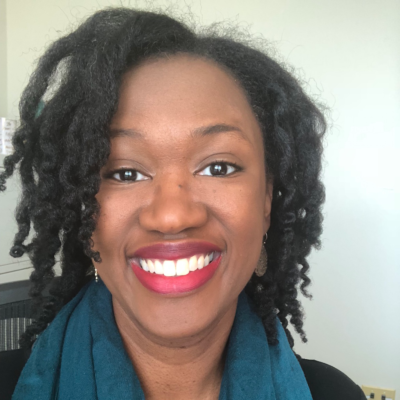Rachel Goode, PhD, MPH, LCSW joins the UNC Nutrition Research Institute as a full-time faculty member, transitioning from a visiting fellow.
SEEKING EQUITABLE INTERVENTIONS FOR EATING DISORDERS AND NON-DIET WEIGHT MANAGMENT
For 10 years, Rachel Goode, PhD, MPH, LCSW, has been conducting research to develop treatments for eating disorders and obesity. She seeks to find equitable and community-engaged interventions for eating disorders and non-dieting approaches to weight management.
“Previously the dominant treatment for obesity focused on calorie restriction. That era of obesity treatment did not produce long-term weight loss,” Goode says. “I hope to change that.” Currently, she is the principal investigator of an NIH Career Development Award (K23) to develop a culturally relevant digital health tool to treat binge eating and obesity.
Getting to where she is now did not come without difficulties. In seeking her master’s degree and PhD from the School of Social Work at the University of Pittsburgh, she found the professors in her field did not have experience with eating disorder research. Goode needed a mentor if she was to complete her schooling. In her search for an advisor, things took an unexpected twist. A professor from the School of Nursing, Lora Burke, PhD, agreed to take Goode on as a mentee. Without Burke, Goode never would have completed her degree to become the researcher she is today. She describes this relationship as, “the most influential mentoring experience” during her journey.
Before earning her PhD, Goode was a social worker. “I spent five years in that field. It shaped my vision for the research I am doing now,” she explains. Connecting with people at that level allowed her to see food-related struggles from a perspective most researchers never see. Goode says, “The diet and nutrition information people had was not enough. What we eat, how to eat it and why you should eat it, was not being addressed in nutrition literature.” This experience hit home.
Her inspiration for her research comes from a personal place. For years she struggled with her relationship with food. Once Goode reached a place of well-being, she declared, “I found what health looked like and wanted others to see it too.” She saw the struggles in her family and community and identified with people through her own journey. In today’s culture, worrying about your weight is “normal.” As humans, we care what we look like and allow those thoughts to impact our relationship with food.
In this country, we are challenged by our food environment, or the physical surroundings that influence what we eat. Certainly, the choices we make about eating are informed by our surroundings: from the food offered in our home by parents, spouses, or roommates to how close we live to a grocery store, and a host of other factors. Society sends mixed messages regarding food. In the US, it can be extremely difficult to choose healthy foods, despite its abundance. Goode recognizes the need to create long-term, culturally relevant solutions.
Current solutions have created more problems for individuals and there are no long-term answers. “I want people to find peace in their relationship with food,” says Goode. Her goal is just that. “The importance of my work lies in intervention. We don’t need more knowledge surrounding eating disorders; people need support around how they implement changes in their daily life,” Goode explains. “Less judgment and more understanding of the social context and determinants of health are necessary. These complex issues circle around privilege, race, and class. We need to consider how we can create treatments for all people, and at all income levels in our communities.”
Goode’s goal is an essential one. “I will continue to push forward until we make progress,” she says. She is playing a key role in advancing personalized nutrition and contributes significantly to NRI’s mission to apply advanced scientific methods for understanding individual requirements for and responses to nutrients.
Learn more about Rachel Goode, PhD, MPH, LCSW and her research at the links below:
- Rachel Goode’s Faculty Page
- Appetite for Life Talk, Fresh Strategies for Weight Management: Learning to Listen to Your Appetite
- The Honor Study
“I am really pleased to welcome Rachel to the NRI team. Her high-impact work on developing, implementing, and evaluating community-engaged interventions to treat obesity and eating disorders represents an exciting and important new avenue for the NRI’s multidisciplinary precision nutrition research program.”
Stephen Hursting, PhD, MPH
Institute Director and Professor of Nutrition

